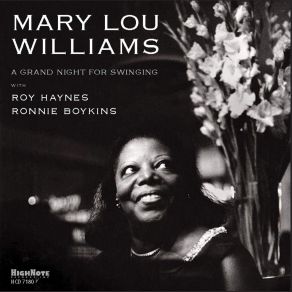A Grand Night for Swinging (Live)
Download links and information about A Grand Night for Swinging (Live) by Mary Lou Williams. This album was released in 2008 and it belongs to Jazz, Bop genres. It contains 9 tracks with total duration of 52:40 minutes.

|
|
|---|---|
| Artist: | Mary Lou Williams |
| Release date: | 2008 |
| Genre: | Jazz, Bop |
| Tracks: | 9 |
| Duration: | 52:40 |
| Buy it NOW at: | |
| Buy on iTunes $8.91 | |
Tracks
[Edit]| No. | Title | Length |
|---|---|---|
| 1. | A Grand Night for Swinging (Live) | 6:57 |
| 2. | I Can't Get Started (Live) | 4:47 |
| 3. | My Funny Valentine (Live) | 4:52 |
| 4. | Bag's Blues (Live) | 6:28 |
| 5. | St. Louis Blues (Live) | 7:30 |
| 6. | Baby Man (Live) | 6:04 |
| 7. | Caravan (Live) | 6:53 |
| 8. | A Grand Night for Swinging (Live) | 4:30 |
| 9. | Interview With Mary Lou Williams (Live) | 4:39 |
Details
[Edit]This High Note release is a live recording of Mary Lou Williams at the Statler Hotel in Buffalo during the winter of 1976 accompanied by bassist Ronnie Boykins and drummer Roy Haynes. First off, the sound of the recording isn't perfect. These tapes were from a private collection and there is a noticeable amount of tape hiss and some crackle throughout. It hardly matters, though, because in spite of it, all three instruments can be heard with startling clarity and immediacy. The material, astonishingly enough, includes only one Williams' original. An accomplished composer, even a prolific one, Williams is heard here playing through tunes like Billy Taylor's "A Grand Night for Swinging" — a tune she actually opens and closes with — Vernon Duke and George Gershwin's "I Just Can't Get Started," "My Funny Valentine," Duke Ellington and Juan Tizol's "Caravan," W.C. Handy's "St. Louis Blues," and, compellingly, "Baby Man," which proceeds from it. Saxophonist John Stubblefield wrote the latter cut. This is poignant in that Williams was capable and indeed saw great value in celebrating the modernism of jazz as a fitting and necessary part of its evolution, just as certain critics as well as musicians were turning from it. The way both pieces are played here are startling, full of finesse, grand rhythmic interplay, and a jaw dropping harmonic reach by the pianist, who had been playing professionally for over 50 years at this point. Here she was still in charge and could front a rhythm section like this with the ease of total command and enjoy its sense of support and skittering improvisation. The only Williams' composition here is "Bag's Blues," a striking variation on Milt Jackson's "Bag's Groove," the melody of which she quotes and harmonically extrapolates on from the very beginning of its performance. The final cut on the CD is a nearly five-minute interview with Williams that is interesting but needs only be heard once. This is a welcome and necessary entry in Williams catalog.